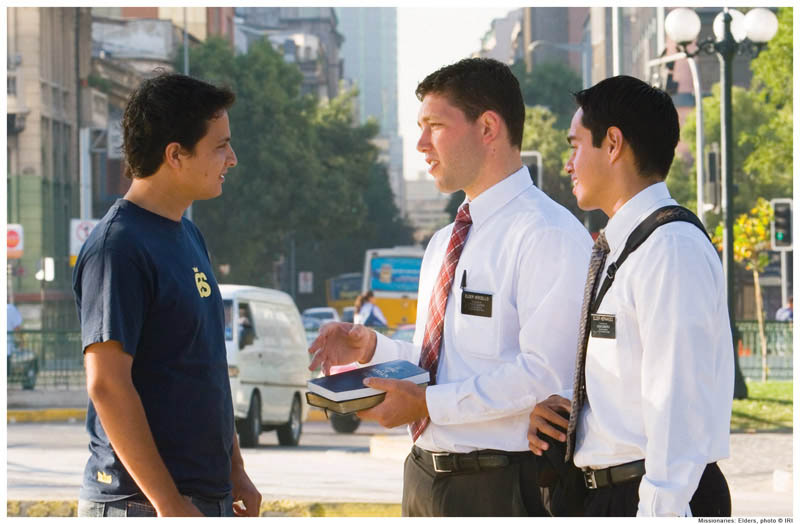Living Abroad vs Serving a Foreign Mission
I want to start off by saying that I did not serve a mission. I have, however, lived for an extended amount of time in a foreign country. As I’ve talked with people who have come back from foreign missions — especially people who have served in the same country I’ve lived in — the differences between serving a foreign mission and living abroad have become really apparent to me. Below are five reasons why I believe foreign-serving RMs shouldn’t claim to be “experts” on the country they served in.
1. You Weren’t Able to Immerse Yourself in the Culture
 On a mission, you have one goal — to preach the gospel. This means you will never be able to truly blend into the culture and the people of the country you’re serving in. I don’t think this is necessarily a bad thing; in fact, I think it helps missionaries focus on why they’re really there. But it does mean your cultural understanding might have some gaps.
On a mission, you have one goal — to preach the gospel. This means you will never be able to truly blend into the culture and the people of the country you’re serving in. I don’t think this is necessarily a bad thing; in fact, I think it helps missionaries focus on why they’re really there. But it does mean your cultural understanding might have some gaps.
Take recreational activities, for example. If you served in Latin America, you were missing out on a huge piece of the culture by not learning how to dance. I mean, literally every Latino party I have ever been to has emphasized dancing.
2. You Probably Didn’t Learn a Lot About Current Affairs or History
At least the RMs I’ve talked to weren’t really paying attention to things like politics or history while they were on their mission. The closest you might have come to learning about either visiting a historical site on P Day or being told to stay inside during a political event, such as a demonstration.
Which is totally fine, your goal isn’t to become an ambassador for that country. However, it’s important to realize that not knowing a country’s current affairs or history is ignoring a large portion of the self-identity of the people in that country.
3. You Were Limited in Where You Could Go
 Walking across the land bridge between Ciudad Juarez, Mexico and the El Paso, Texas at 1 a.m. by myself really gave me insight into the lives of the people who go back and forth across the border every day and how scary and difficult it can be. Same with the time I went to a night club to watch a live banda. I wasn’t in the most savory of places, but I did learn a lot of the culture.
Walking across the land bridge between Ciudad Juarez, Mexico and the El Paso, Texas at 1 a.m. by myself really gave me insight into the lives of the people who go back and forth across the border every day and how scary and difficult it can be. Same with the time I went to a night club to watch a live banda. I wasn’t in the most savory of places, but I did learn a lot of the culture.
If I had been a missionary serving in Ciudad Juarez, I never would have had those experience — at least not if I was following mission rules.
I’m not saying you need to put yourself into dangerous situations or go to sketchy places to understand a country, but being limited to certain areas and getting home by 10 p.m. only allows you see so much of a culture.
4. You Didn’t Have to Worry About the Burdens of Day-to-day Life
As a missionary, you land in whatever foreign country you’re serving and everything is set up for you. You never have to worry about where you’re going to live, how to pay rent or who to contact to pay your utilities. You’re planning the rest of your days like crazy, but you just don’t have to worry about these kinds of basic adulting tasks.
So while you may have learned a lot about where you served, you didn’t get to experience what it’s like to live there. I will never forget realizing that my gas stove in my apartment in Mexico was hooked up to a tank and not through city- or private-owned pipes (I know, I clearly hadn’t gotten out much before this point in my life) and then realizing I would have to figure out how to refill the tank.
No matter where you’re living, learning to “adult” is definitely a refiner’s fire — or maybe I just struggled an unusual amount with it. Learning to live on your own in a foreign country allows you to relate to others there in a way that you can’t simply by preaching the gospel to them.
5. You Used and Heard Filtered Language
 On a mission, the language you use and hear, for the most part, is filtered. People are talking to you in a certain way and in certain situations, so they only use a set of words. I’m not just talking about swear words either, although that could, hopefully, be included.
On a mission, the language you use and hear, for the most part, is filtered. People are talking to you in a certain way and in certain situations, so they only use a set of words. I’m not just talking about swear words either, although that could, hopefully, be included.
For example, the first Spanish class I ever took at BYU was completely full of returned missionaries (except me for me). It was really interesting, though, to see the differences in our vocabularies. I had no idea how to pray in Spanish, for example, something I had to have a classmate teach me how to do.
My classmates, in contrast, didn’t know words relating to issues like climate change or government. They just never had the opportunity to learn those words. Sometimes you don’t learn as many idioms because members only talk with you in a certain way.
Why the Differences Matter
Okay so why does this all matter? I think there has been this idea within Latter-day Saint culture that a foreign mission is somehow “better” because we view it as a cultural exchange. While I’m not denying that people do learn about and come to love the country they serve in, the purpose of a mission isn’t to become an expert on whichever country you’re serving in; it’s to bring people to Christ. And that’s the same whether you’re in Florence, Arizona, or Florence, Italy.
I also think we need to recognize the value of living abroad. I’ve seen people try to present a foreign mission on a resume as some kind of ambassador experience, but that’s simply not the case. Living abroad brings unique experiences that, in my opinion, everyone should experience at some point.
And lastly, we need to stop assuming that because someone speaks a foreign language or says they lived in a foreign country, they must have served a foreign mission. People have made this assumption about me multiple times, and honestly, it’s getting old.
Bottom line — respect those who chose to go on a mission (foreign-serving or not) and realize that there is a whole breadth of experience within the Church. We have a lot to learn from each other, so let’s not get hung up on details like if someone served a mission or where.


